My recipe for Kashmiri Pulao is packed with toasted nuts and warming spices for an aromatic rice dish that is mild and faintly sweet in taste. Whether you serve this gluten-free and vegetarian dish as a side or light lunch, you’re sure to love it.
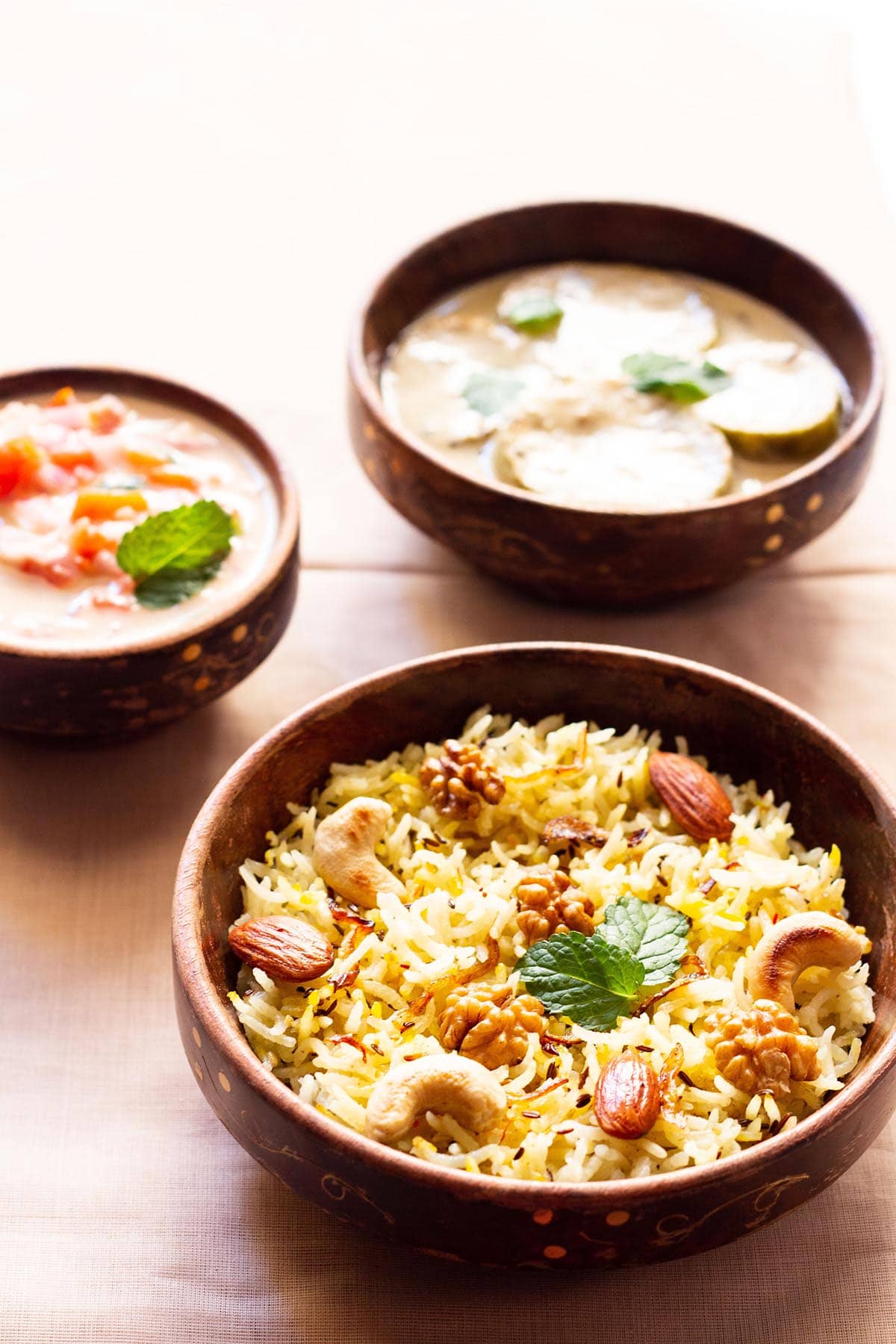
Table of Contents
What is Kashmiri Pulao?
Kashmiri pulao is a delicious variant of rice pulao from Kashmiri cuisine made with nuts, dried fruits, saffron and fresh fruits. Generally, a pulao is rice that is flavored with various spices, then bulked up with the addition of vegetables, nuts or even meats.
Mostly pulao variations are usually made with long-grained and fragrant basmati rice. The grains are cooked to perfection without any sticking so that each individual piece of rice keeps its shape.
While some recipes call for making pulao with stock, broth or even coconut milk, this simple recipe for Kashmiri pulao requires only water and dried spices to flavor the grains.
The northernmost Indian state of Kashmir rests high in the Himalayas and is often called “paradise on earth.” It is easily considered one of the most scenic and beautiful places in the world.
Primarily an agricultural state, Kashmir grows rice as the staple crop. As with this Kashmiri pulao recipe, much of the cuisine is based around this life-giving grain. Kashmir is also India’s leading exporter of saffron, the prized spice that is responsible for this pulao’s color and complex flavor.
The valley of Kashmir is also quite productive, with widespread orchards that grow fruits like apples, pears and peaches, and nuts like walnuts and cashews. These are some of the top exports of the region.
While Kashmir is incredibly beautiful, the climate is quite cold for much of the year. The addition of dried fruits and nuts adds sweetness and warmth that is ideal for the chilly landscape. If you are interested in Kashmiri cuisine, I recommend you also try Kashmiri Dum Aloo, Kahwa Tea and Kashmiri Biryani.
Why This Recipe Works
Kashmiri pulao is one of the easiest pulao recipes to make and, unlike other pulaos, this one is on the sweeter side as a result of being garnished with both dry fruits and fresh fruits. It is also entirely customizable depending on your preferences.
The fresh fruits that are often added to Kashmiri pulao are pineapple, apple and pomegranate. Dry fruits and nuts that are often added include almonds, raisins, pistachios, walnuts and cashews.
Most variations of Kashmiri pulao will use a mix of fresh and dry fruits as well as nuts. I should note that when I made this version of Kashmiri pulao, I did not add any fresh fruit. Since pulao is often used as a side dish, it is important to keep in mind what you plan on serving it with.
I personally like to serve this pulao with lauki yakhni (fried bottle gourd slices in yogurt sauce) along with onion tomato raita. In my home, nobody really enjoys the combination of fruits with curry or spiced raita, so I omitted it.
That said, if you are eating this as is or pairing this with sweet raita like pomegranate raita, mango raita or pineapple raita, I definitely recommend adding the additional fruit to your Kashmiri pulao.
How to make Kashmiri pulao
Prep and Cook Rice
1. Measure all the ingredients for the pulao and keep ready. Rinse 1 cup basmati rice thoroughly in water until the water is clear of starch. Soak the rice grains in enough water for 20 to 30 minutes.
I recommend to use aged basmati rice for the best fluffy, non-sticky texture.
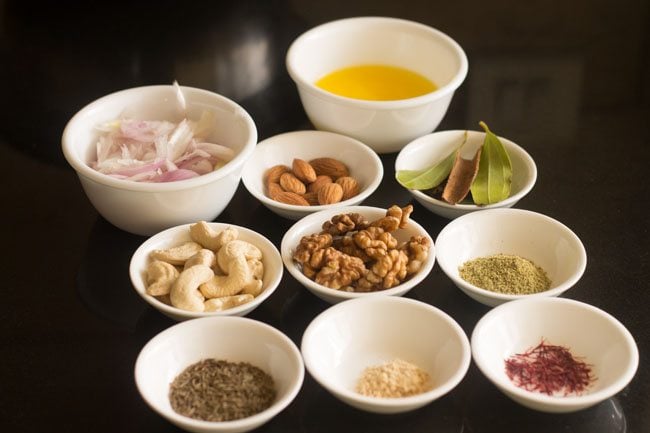
2. On a low or medium flame, heat 2 to 3 tablespoons oil or ghee in a deep pan.
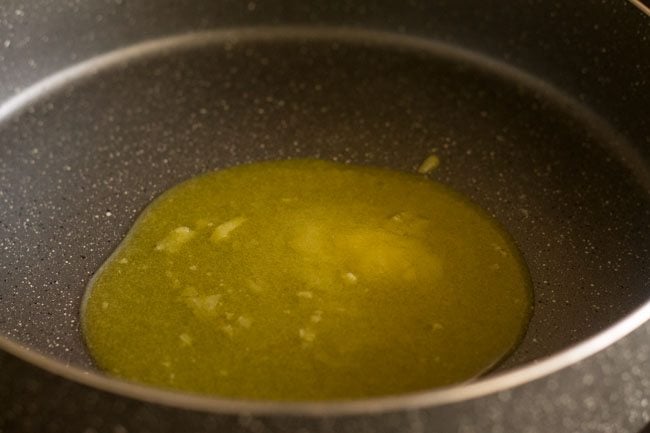
3. Add 1 inch cinnamon stick, 1 teaspoon caraway seeds (shahi jeera), 1 tej patta (Indian bay leaf), 3 cloves, 2 to 3 green cardamoms and 1 to 2 black cardamoms.
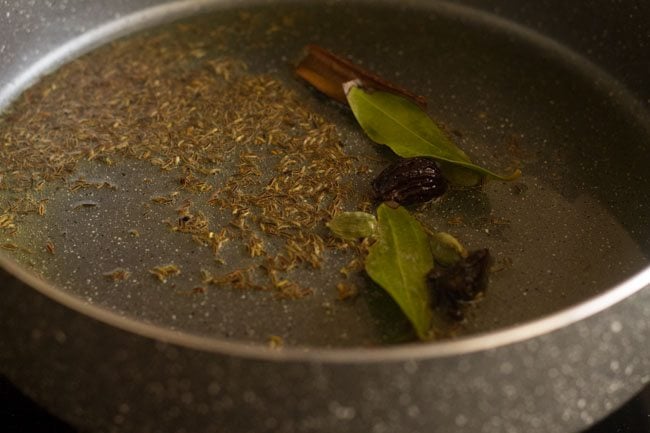
4. Fry the spices for some seconds or till they crackle and the oil becomes fragrant.
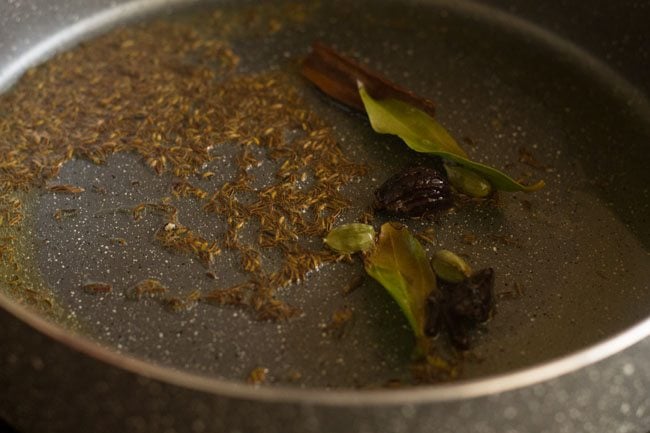
5. Now lower the heat or switch off the heat. Add the ½ teaspoon dry ginger powder (saunth) and 1 teaspoon fennel powder.
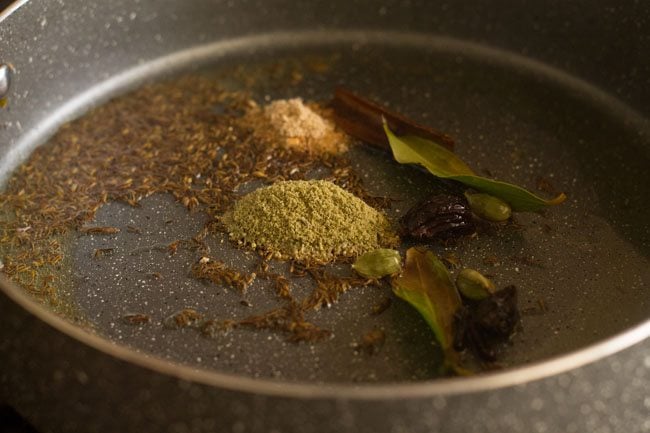
6. Stir well.
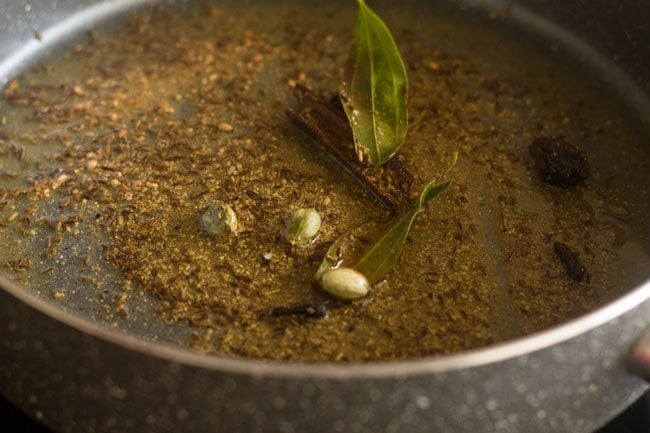
7. Add 1 cup of soaked and drained basmati rice.
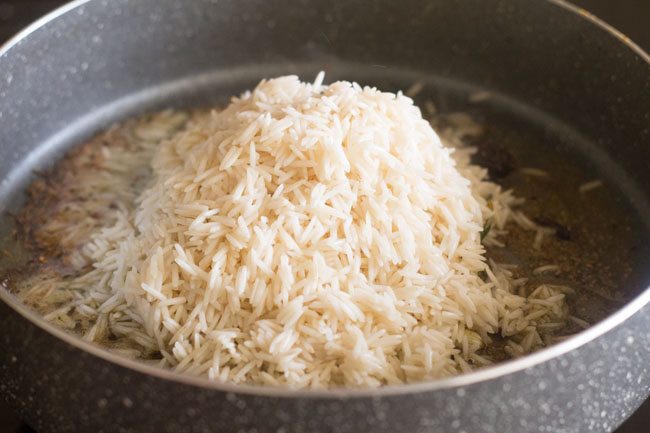
8. Gently mix and sauté for a minute on low heat.
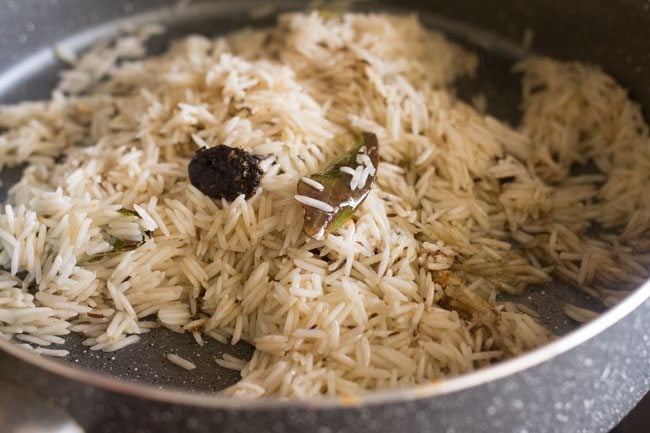
9. Add 2 pinches of crushed saffron (kesar).
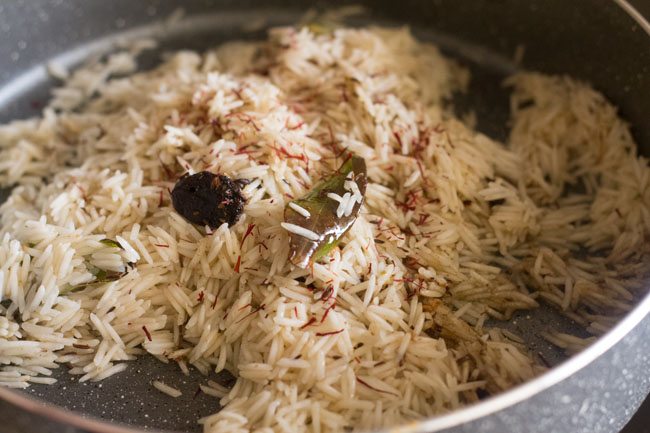
10. Gently mix again.
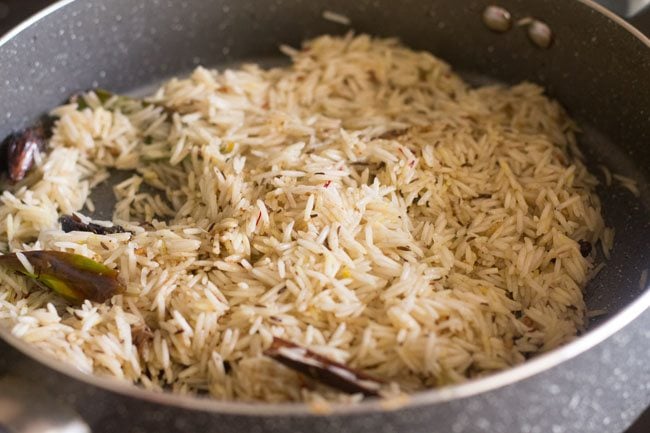
11. Pour in 2 cups of water.
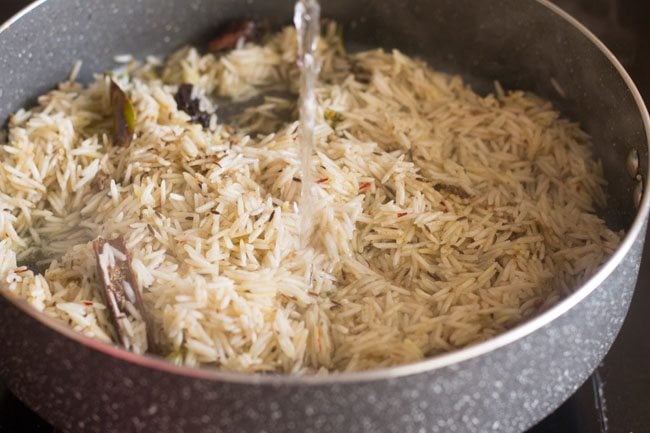
12. Add salt as required.
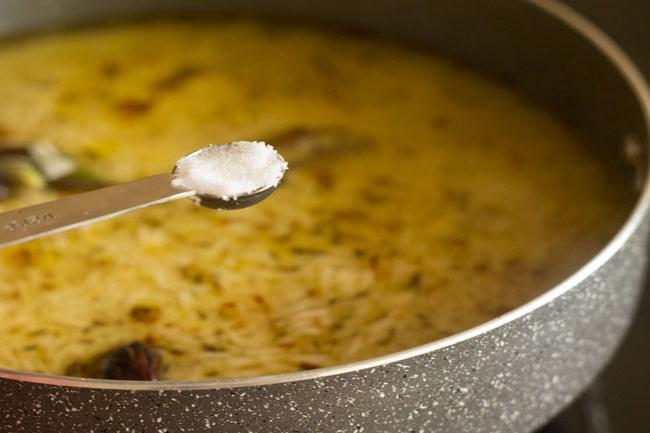
13. Mix and stir well. Check the taste of the water and it should taste a bit salty like sea water.
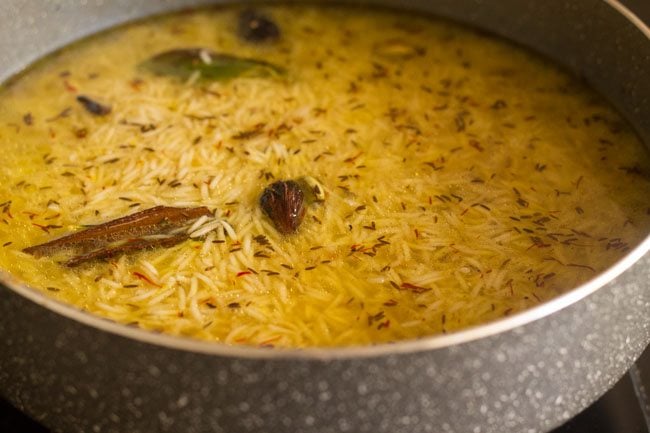
14. Cover the pan tightly and cook rice on a medium-low heat. When the rice is cooking, prepare the garnish as shown in the step below.
In between do check the rice a couple of times. If you see that the water has evaporated and the rice grains are undercooked, add a splash of hot water. Cover the pan and continue to cook.
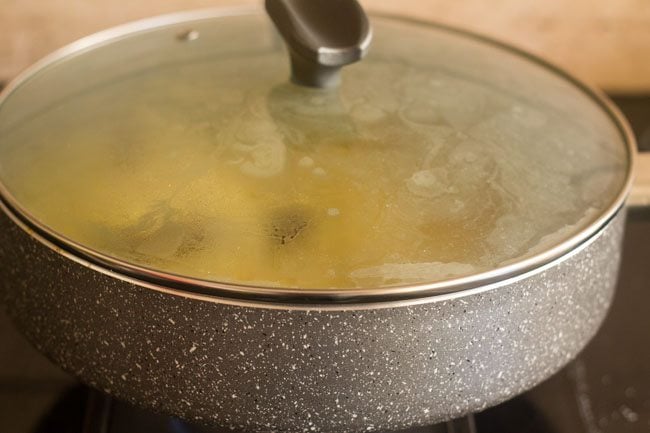
Make Garnish
15. Heat 2 tablespoon ghee or oil in a frying pan.
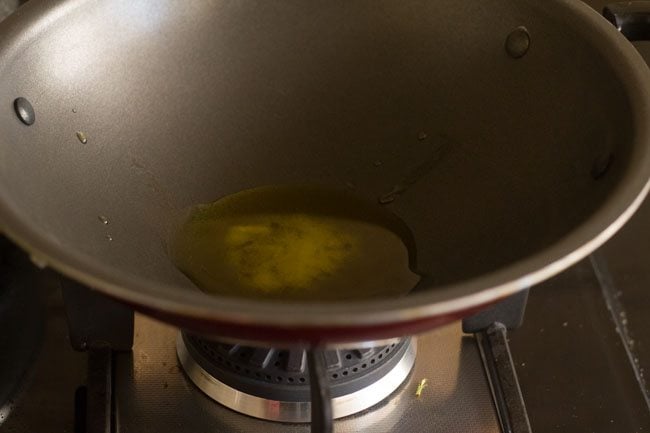
16. Add one sliced onion or ½ cup sliced onion.
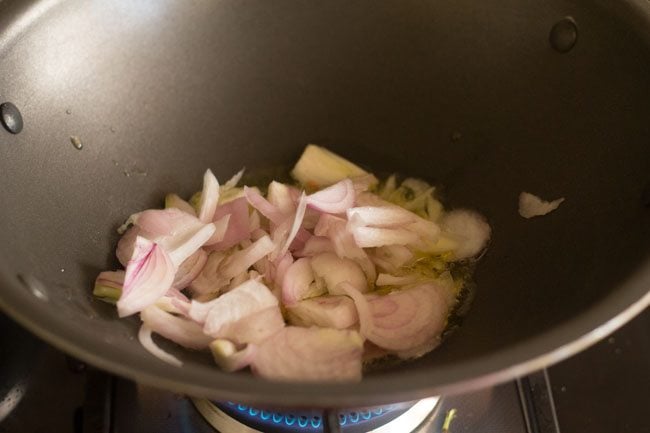
17. Add a pinch of salt to the onions to encourage sweating.
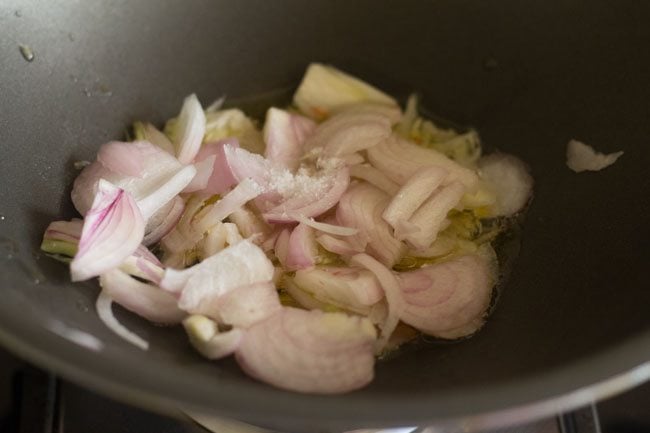
18. Saute the onions till they are golden or caramelized and crisp.
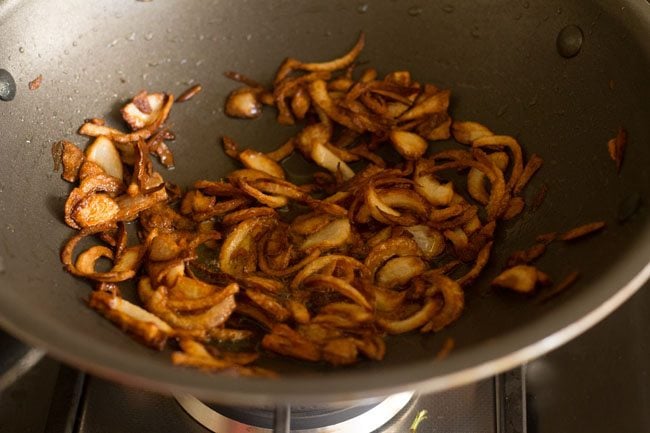
19. Remove with a slotted spoon and drain on kitchen paper towels.
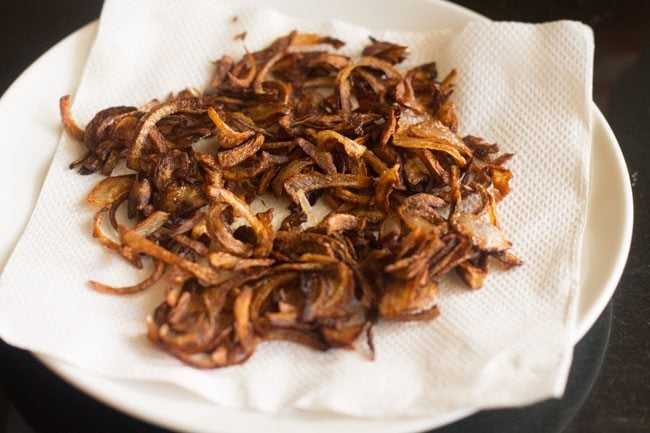
20. There will be some oil or ghee left in the pan. In the same oil or ghee, first fry 10 to 12 almonds till they become crunchy and crisp.
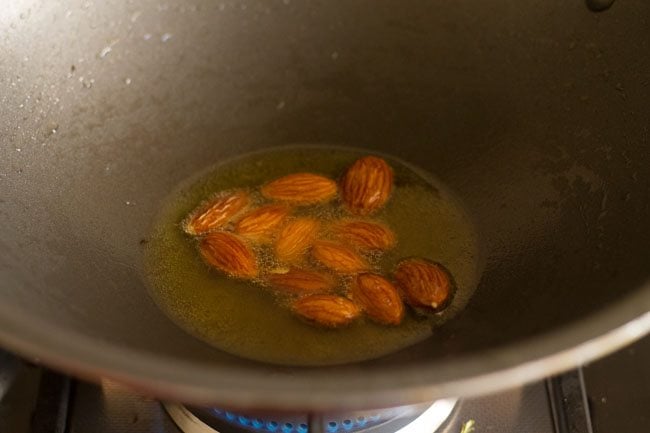
21. Remove and place fried almonds on kitchen paper towels.
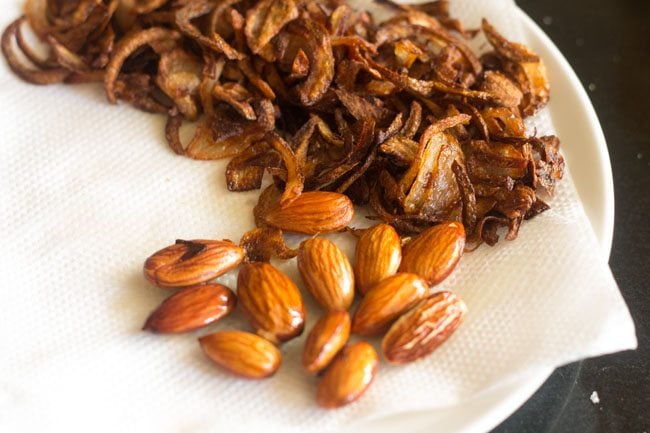
22. Next fry 10 to 12 cashews till they are crisp and lightly browned.
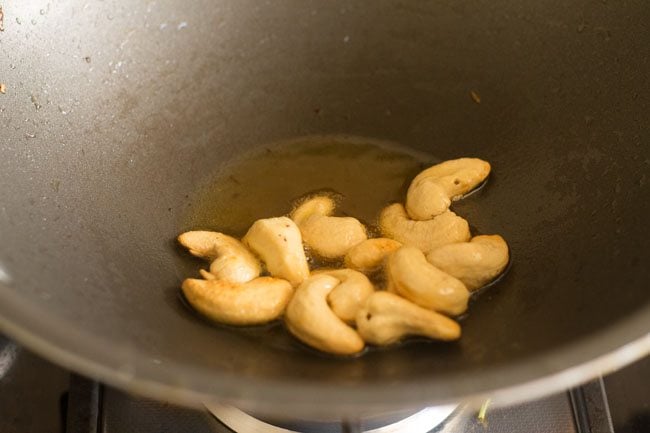
23. Remove fried cashews. Place them on kitchen paper towels.
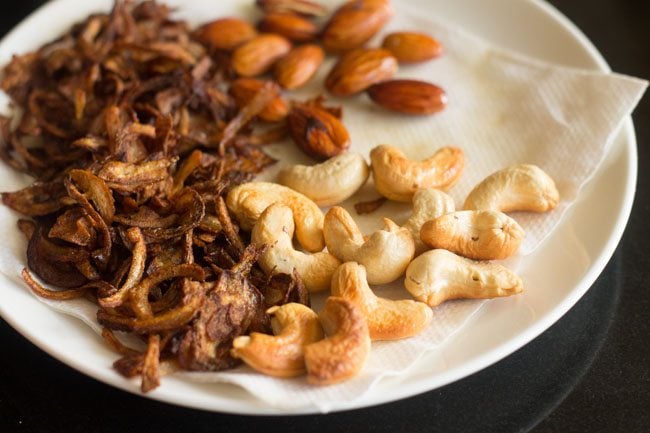
24. Also fry 10 to 12 walnuts till they are crisp and lightly browned.
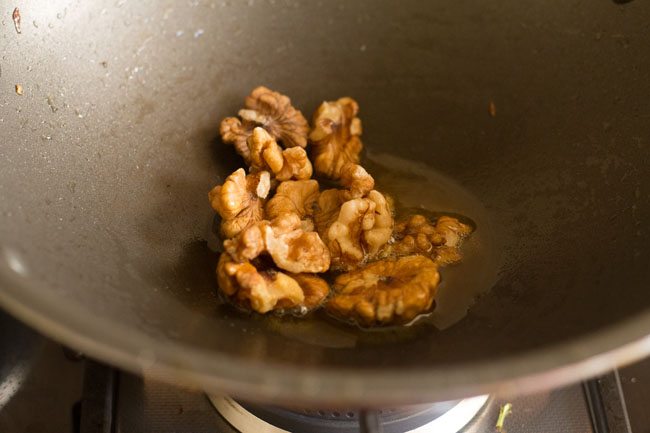
25. Remove fried walnuts. Place them on kitchen paper towels.
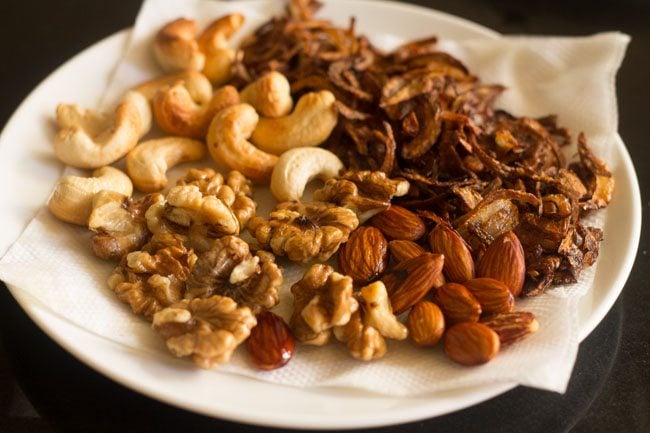
26. Continue cooking the rice till all the water is absorbed and the rice is tender, softened and cooked well.
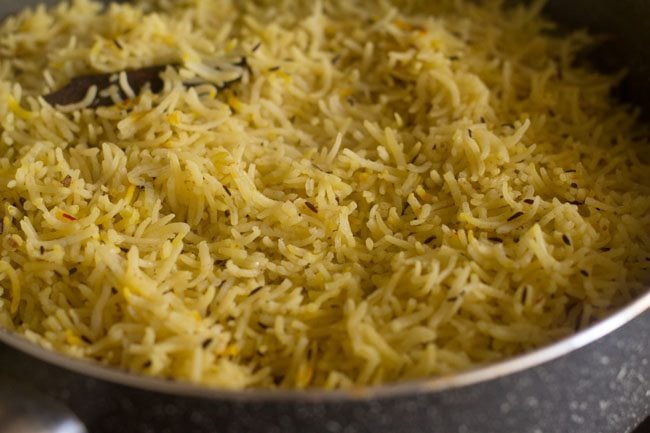
27. When done, fluff the rice.
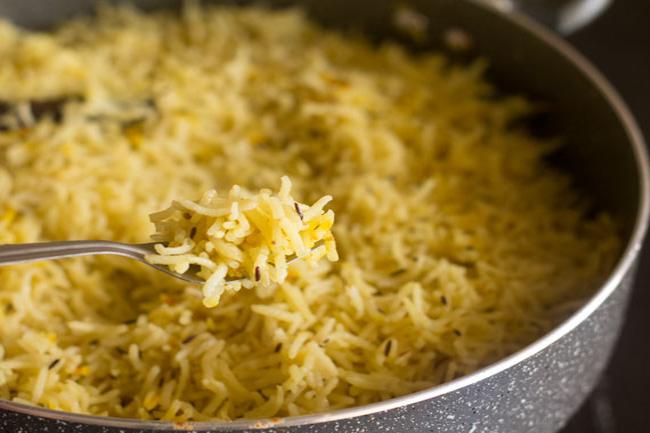
28. While serving the Kashmiri pulao, garnish with the fried onions, nuts and any optional fruits that you prefer. You can add fresh fruits like apple, pineapple and pomegranate arils.
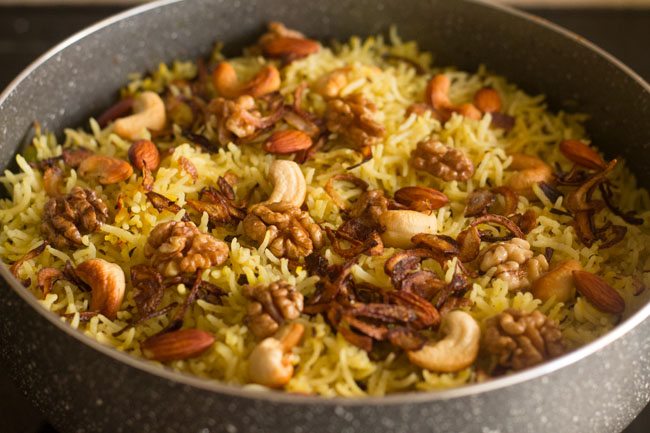
Serve Kashmiri pulao hot with raita or salad. It makes for a filling and satisfying meal. You can also serve it with a simple Dal Tadka or any paneer dish or vegetable curry.
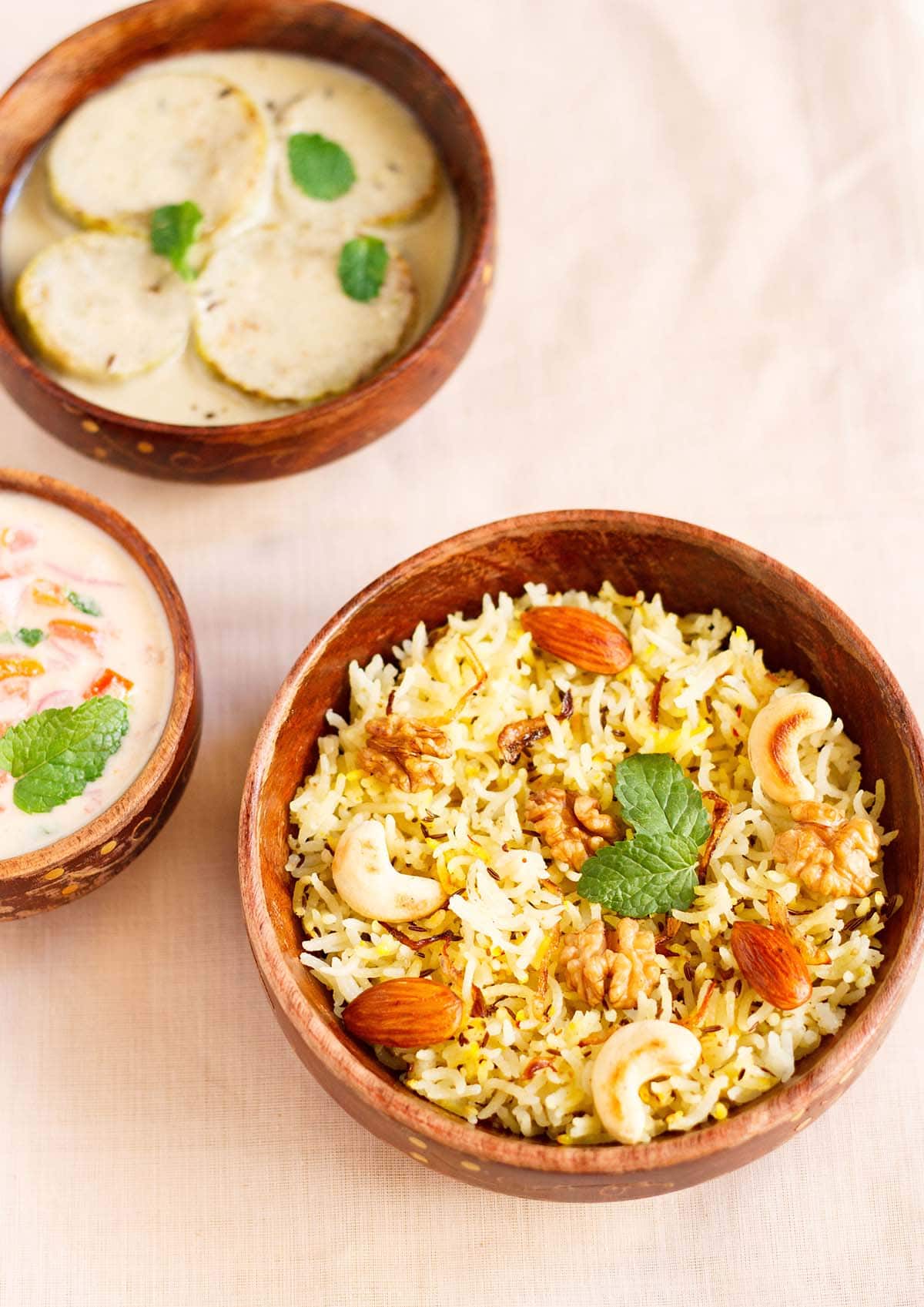
FAQs
While I believe that this Kashmiri pulao is *best* when eaten fresh from the frying pan, the leftovers will keep well in an airtight container for up to 1 day.
I love the combination of almonds, cashews and walnuts in my Kashmiri pulao. These nuts are grown in the region, and the flavors are delicious. If you like, you can also add pistachios to the list of nuts you add.
If you opt to add fruit to your pulao, you can opt for either fresh fruits like pineapple, pomegranate or apple, or dried fruits like raisins. Depending on what you are serving with the pulao, you may also decide to omit the fruit entirely.
More Pulao Varieties!
Rice Recipes
Rice Recipes
Paneer Recipes
Please be sure to rate the recipe in the recipe card or leave a comment below if you have made it. For more vegetarian inspirations, Sign Up for my emails or follow me on Instagram, Youtube, Facebook, Pinterest or Twitter.
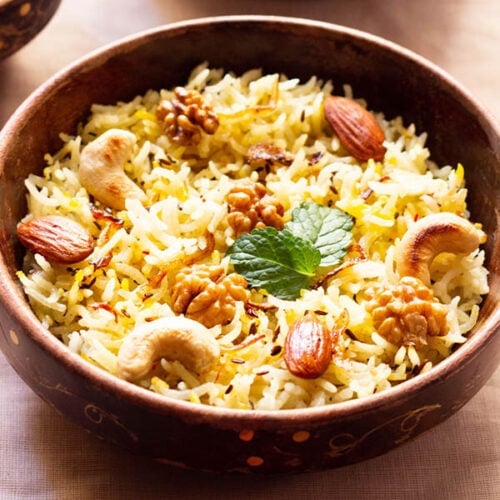
Kashmiri Pulao
Ingredients
For kashmiri pulao
- 1 cup basmati rice soaked in water for 20 to 30 minutes
- 1 inch cinnamon
- 1 teaspoon caraway seeds (shahi jeera)
- 1 tej patta (Indian bay leaf)
- 3 cloves
- 2 to 3 green cardamoms
- 1 to 2 black cardamoms
- ½ teaspoon dry ginger powder (ground ginger)
- 1 teaspoon fennel powder (ground fennel)
- 2 pinches saffron strands
- 2 to 3 tablespoons Ghee or any neutral tasting oil
- 2 to 2.25 cups water or as required
- salt as required
For making garnish
- ½ cup thinly sliced onions or 1 medium-sized
- 10 to 12 cashews
- 10 to 12 almonds
- 10 to 12 walnuts
- 2 tablespoons Ghee or any neutral tasting oil
Instructions
Making kashmiri pulao
- Rinse basmati rice a few times in water until the water is clear of starch. Soak the rice in enough water in a bowl for 20 to 30 minutes. Later drain all the water and set the soaked rice aside.
- On a low or medium heat, heat oil or ghee in a deep pan or pot.
- Add cinnamon stick, caraway seeds, tej patta, cloves, green cardamoms and black cardamoms.
- Fry the spices for some seconds until they crackle and the oil becomes fragrant.
- Now lower the heat or switch the heat off. Add the dry ginger powder and fennel powder. Mix and stir well taking care that you do not burn these ground spices.
- Add the soaked basmati rice. Mix gently and sauté for a minute.
- Add whole or crushed saffron strands. Mix and sauté.
- Pour water and add salt as required. Stir and mix again. Check the taste of the water and it should taste a bit salty. Cover the pan tightly and simmer on medium-low heat until the rice grains are tender. When the rice is cooking, prepare the garnish.
Making garnish
- Heat 2 tablespoons ghee or oil in a frying pan. Add the sliced onions.
- Also add a pinch of salt and sauté the onions till they are golden or caramelized and crisp. Remove with a slotted spoon and place on kitchen paper tissues. Stir often when sautéing the onions.
- Some ghee or oil will be left in the pan. To the same ghee or oil, add the almonds. Fry them until they become crisp and crunchy. Remove and place fried almonds on kitchen paper tissues
- Now fry the cashews till they are crisp and lightly browned. Place them on kitchen paper tissues
- Also fry the walnuts till they are crisp and lightly browned. Remove fried walnuts. Place on kitchen paper tissues
- Cook the rice until softened, fluffy, tender and all the water has been absorbed. When done, fluff the rice with a fork.
- While serving top Kashmiri pulao with the caramelized onions and the fried nuts garnish. You can also garnish with fresh fruits cubes of apple, pineapple or pomegranate arils.
- Kashmiri pulao can be enjoyed as is or with a side of any raita or paneer curry or vegetable curry. You can also serve it with dal-tadka.
Nutrition Info (Approximate Values)
This Kashmiri Pulao recipe from blog archives (first published in May 2013) has been republished and updated on 6 June 2021.
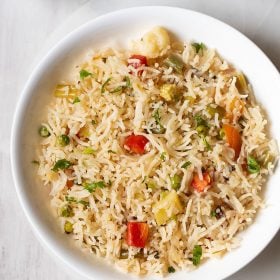
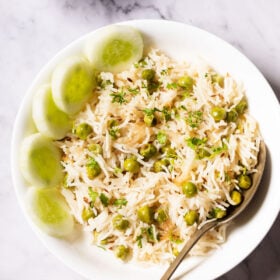
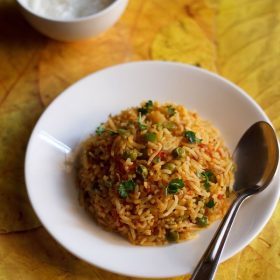
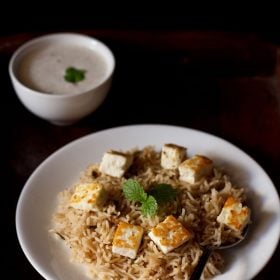








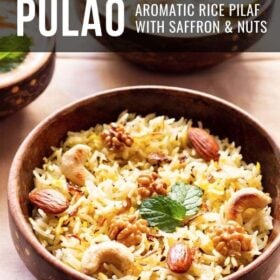
Hi Dassana!
I appreciate the details you shared about the geographic relevance in regards to the ingredients in this dish. I’m excited to try it and have a question: If I were to add fresh fruit, would I be cooking the fruit with the rice so that it softens?
Or would I be adding it at the end – stirring it in, so that it’s fresh and firm? Also, how would the fruit be cut if it was pineapple or apple, for instance. And, do pineapple and apple grow in Kashmir?
Thanks Robin. You add the fresh fruits as a garnish and do not cook with them. Alternatively you can sauté them lightly in a bit of ghee if you prefer and later add them as a garnish.
The fruits are cut in small cubes of about ½ inch. Apples grow in Kashmir but not pineapples. We also have a variety of apples called Kashmiri Apples.
I presume the inclusion of pineapple in the dish must have been invented by some restaurants.
Thank you for the detailed response, Dassana, they are helpful to me!
Welcome and thanks.
I dont have saunth powder…so can I use ginger paste instead???
Yes, you can use ginger paste. ½ to 1 teaspoon ginger paste will work well in the recipe.
thank u
welcome shilpa.
fennel powder is just powdering fennel? or we need to roast, dry roast it and make powder?
i usually powder fennel directly in mixer and use it as required. but for the amount mentioned in the recipe, you can lightly roast and then crush in a mortar-pestle.